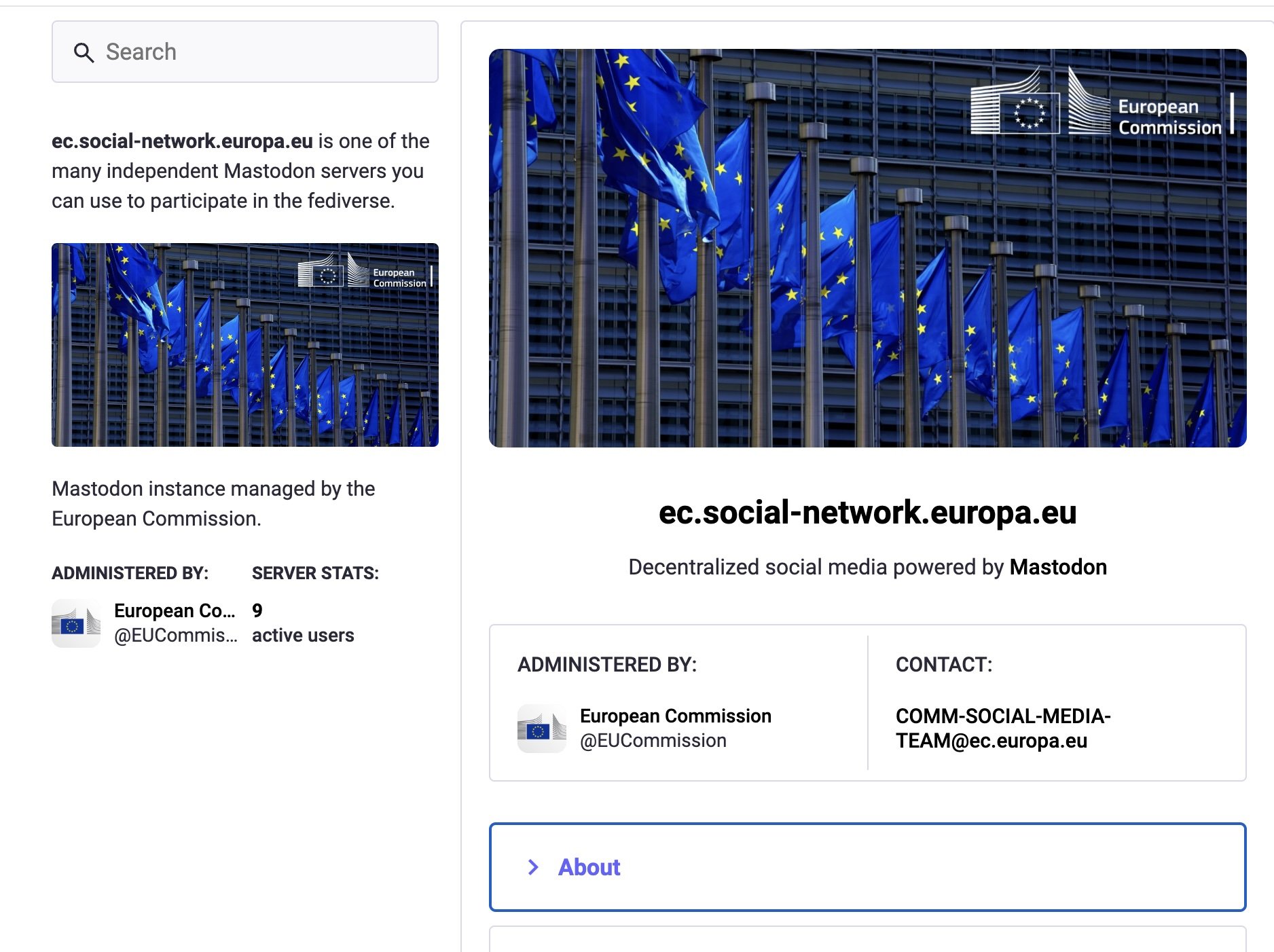Today Mastodon, the open source social platform that is a key part of the decentralised Fediverse, announced the availability of paid hosting, moderation, and support services for organisations seeking to operate their own Mastodon servers.
This initiative marks a pivotal step toward achieving financial sustainability while maintaining the commitment to decentralisation, openness, and community-driven governance.
I spoke to Andy Pipe, Head of Communications at Mastodon, to learn more.
Mastodon is a decentralised, open source social network that enables users to self-host their own servers and connect with others across the Fediverse.
Founded in 2016, the project has grown into a global community of 8,500 servers, offering a privacy-first alternative to centralised social platforms. In recent months, Mastodon has expanded its role as a trusted provider of Mastodon services, partnering with public institutions and private entities alike.

In 2024, Mastodon gGmbH took over hosting of the European Commission’s Mastodon service.
According to Piper,
“They’ve been on Mastodon for quite a while and have also helped fund some of our features through their Next Generation Internet grant programs.
About 18 months ago, they decided they didn’t want to run their own server anymore, so we took that over. They still use it to share news, but we now handle the operational side."
Mastodon also signed a support contract with the state of Schleswig-Holstein in Germany. More recently, it started working with the city of Blois, in France.
"While all these customers are public institutions, we’re also very proud having added AltStore as a customer in the last few weeks," shared Piper.
Beyond those formal relationships, Mastodon is in touch with a number of European governments.
According to Piper:
“At FOSDEM in Brussels earlier this year, for example, four or five national governments came by to talk to us about features and our future plans. So while only a few relationships are formal, many others are active discussions.
Over all, these partnerships have provided a reliable, predictable revenue stream, supporting the organisation’s mission and helping to sustain the Fediverse.”
Decentralised, but supported: Mastodon launches organisational hosting
Building on this momentum, Mastodon is now offering organisations the option to host their own Mastodon servers through two primary models:
1. Fully operated servers under the organisation’s domain, managed by Mastodon’s team with optional moderation services.
According to Piper, this is an “all-in” model — “like what we do with the European Commission. We handle everything: patching, updates, operations. That’s best for large organisations — often governments — that don’t want to deal with infrastructure themselves.”
2. Support contracts for in-house operations teams, enabling collaboration on server management and maintenance.
This second model is support-focused.
“Some organisations, particularly governments or universities, need to host in their own secure environments because of procurement or compliance requirements. In those cases, we help with installation, updates, and ongoing support, while they retain full control of the infrastructure,” shared Piper, noting that universities, and large brands that don’t want their communications controlled by private third parties are especially interested in organisational hosting.
More customisation on the horizon
In terms of customisation, currently, organisations can do light branding such as logo, colours, and background. But Mastodon recently secured an EU grant to add what it calls institutional features.
According to Piper, this includes things like customising the homepage feed, integrating with single sign-on, and other features public institutions and companies specifically need.
"These will start rolling out in the next couple of releases. So customisation is already possible, but we’re making it much more powerful.”
Moderation without misalignment
I was interested in how moderation factors into support services for companies running their own Mastodon services. Piper explained that the organisation runs two Mastodon servers themselves, “and they each have published moderation rules."
"Our own moderation policies are common-sense and in line with German regulations, which are quite strict. That gives us a strong foundation to work from.
But when organisations host with us, the expectation is that they’ll run by their own rules and standards. Some will want their own moderation teams. Others may ask us to help — in which case we’d adapt to their requirements.”
That said, Piper stressed that so far there hasn’t been any misalignment between Mastodon and organisational moderation.
Lessons from Gab and Truth Social
Beyond moderation tasks alone, the question of inclusion in the Fediverse is deeply intertwined with issues of free speech and, therefore, how communities are moderated. After being dropped by hosting providers and payment processors due to its reputation as a hub for hate speech and extremist content, Gab — a ‘free-speech platform notorious for attracting users banned elsewhere — including white supremacists, neo-Nazis, and members of the alt-right — switched to Mastodon’s open-source software to relaunch its platform in 2018.
Mastodon’s founder Eugen Rochko and the wider community strongly condemned Gab’s move. While the open-source license allows anyone to use the code, Mastodon made clear it did not endorse Gab. As a result, Gab’s servers were quickly defederated — meaning other Mastodon servers refused to connect with them.
This effectively isolated Gab, keeping it from interacting with the broader Mastodon/ActivityPub ecosystem.This means that while Gab continues to use Mastodon code but exists as a closed-off island. It doesn’t interact with the Fediverse because nearly every other server has blocked it.
Likewise, Truth Social, backed by Donald Trump’s media company, was found to have used Mastodon’s code in 2021 without initially complying with the open-source license terms (AGPL). That meant they didn’t provide access to the modified source code as required. Mastodon’s team threatened legal action to enforce the AGPL. Under pressure, Truth Social eventually released its source code and came into compliance.
However, like Gab, Truth Social runs on Mastodon code but does not federate with the wider Mastodon/ActivityPub network. It remains siloed, intentionally disconnected from the Fediverse.
There was also a case in Turkey where a “homegrown” social network turned out to be Mastodon code with federation turned off. According to Piper, essentially, it was a local network controlled by the government.
“That’s not unlike what’s happening in the US with TikTok — governments want their own platforms for influence. This is why plurality matters. A diverse ecosystem of interoperable servers reduces the risk of capture and control.”
Usability gains: from quote posts to new design
Mastodon is also focused on usability, bringing in a new design team. It recently launched 'quote posts,' “a long-requested feature,” according to Piper.
“It’s not yet network-wide, but we’re testing it with feedback channels and iterating based on user input.” He admits that some in the Mastodon community worried quote posts would be abused, “but we’ve seen positive use cases.
For example, communities of colour use them to amplify each other, and journalists use them for curation. We want to support those positive patterns while mitigating risks.”
Earlier this year, Mastodon announced plans to create a non-profit to own Mastodon’s assets and oversee governance.
“Governance is our number one priority — getting the non-profit established properly. That will give people more confidence in Mastodon’s structure for the long term”, shared Piper.
However, he admits that — surprising no one — “setting up in Germany is complex, so it’s taken longer than expected.
"But it’s still a top priority, and there will be announcements soon. The hosting and support services were announced first simply because they were ready earlier. The non-profit is still very much on track.”
Balancing commercialisation and community values
Mastodon is known as community-driven, and it's not always easy to balance community values with organisational decisions. At the start of the year, the organisation identified three priorities — financial sustainability, governance, and usability — and also articulated our team values.
“Communicating those values better is something we’re working on,” shared Piper.
“Eugen Rochko remains central, but Mastodon is bigger than any one person. We want to build a better social web — genuinely. That’s easy to say, harder to do. We’ve made mistakes.
For example, we drafted new terms of service earlier this year, and the community pushed back. We withdrew them and will reopen the consultation soon.
The key is to be responsive, admit when we make mistakes, and continually improve. At the end of the day, we’re humans behind the project, and we try to build responsibly.”
Overall, Mastodon’s approach balances commercialisation and its core principles. According to Piper, while paid services will contribute to a diversified revenue model, the organisation remains committed to funding its operations primarily through community contributions and grants. This strategy ensures the Fediverse’s independence and avoids centralisation, a cornerstone of its design.
Mastodon will continue to prioritise open source development and community engagement, with its own server serving as an entry point for new users.
Piper asserts:
“We’re extremely grateful to everyone that runs a Mastodon server as part of the network, including all the companies that manage Mastodon services for groups, communities, organisations, and individuals.
We want to work together with everyone in the ecosystem, in order to ensure that a range of Mastodon servers support the community, and that the Fediverse as a whole remains diverse, free and open to all.”
In terms of looking ahead, Piper hopes overall for more diverse pockets of social networks outside the control of governments and propagandists — “places where people can connect authentically again.”
“Ideally, we’ll return to the kind of authenticity we had on the internet 15–20 years ago, rather than the heavily algorithm-driven feeds we have today.
The risk, of course, is homogenisation if people don’t make different choices. That would be dangerous.
But I remain hopeful: if people do embrace alternatives, we’ll end up with a healthier, more diverse social ecosystem.”
Mastodon’s expansion reflects its broader goal of empowering users worldwide to self-host and manage their own social networks. The organisation is committed to collaborating with partners, developers, and users to ensure the Fediverse remains a vibrant, inclusive, and sustainable space for all.
Image: Battenhall.



Would you like to write the first comment?
Login to post comments